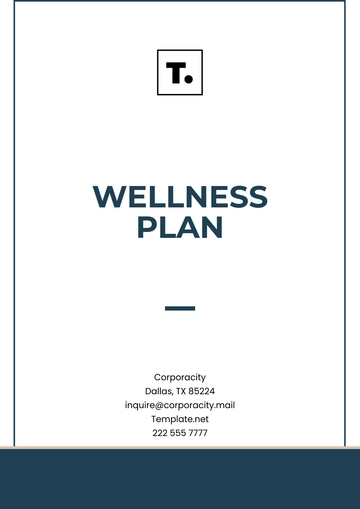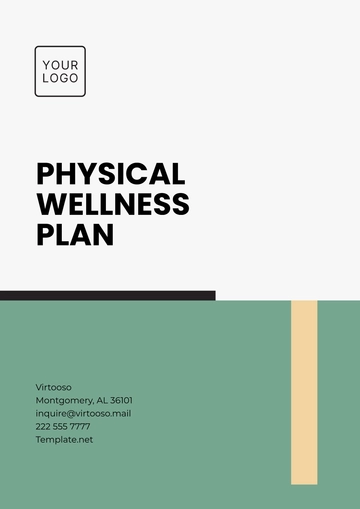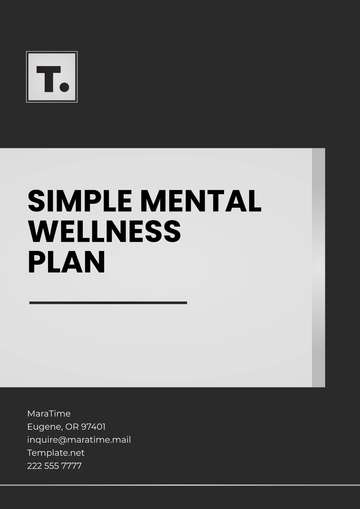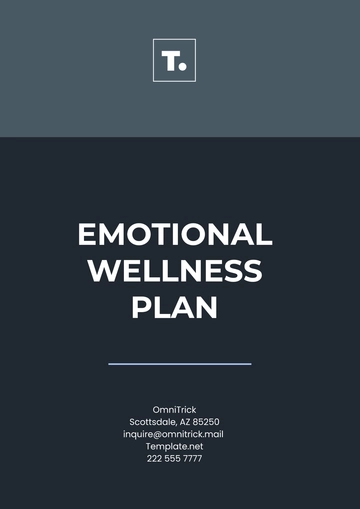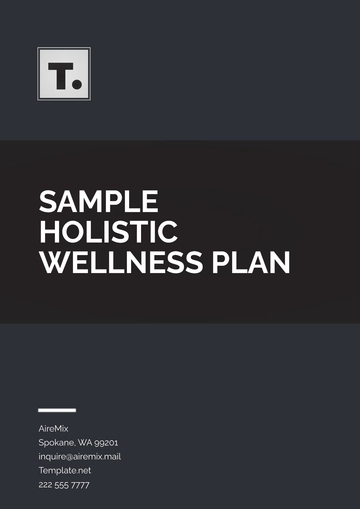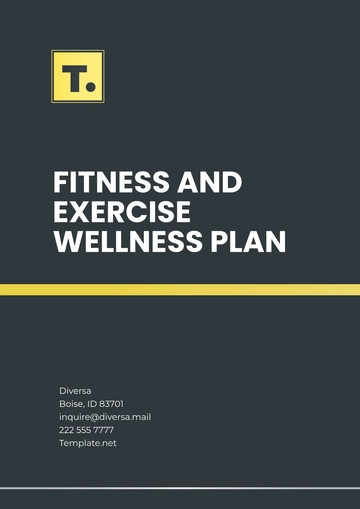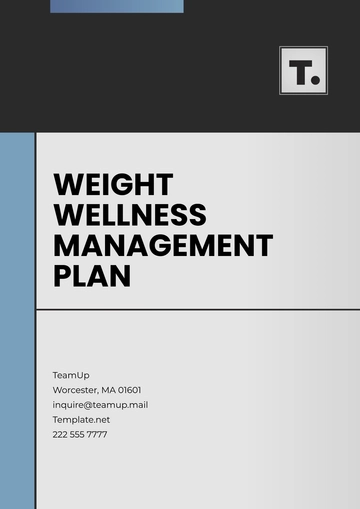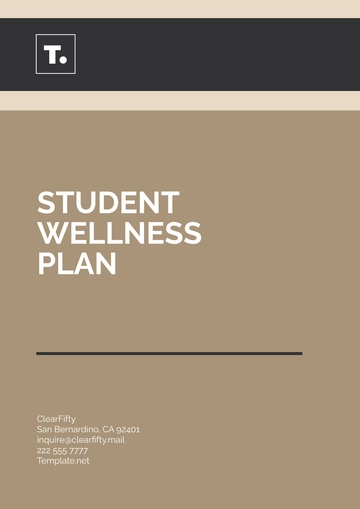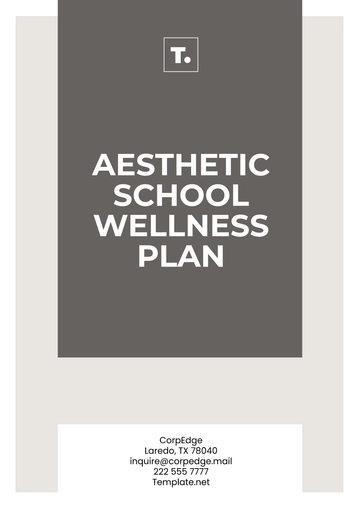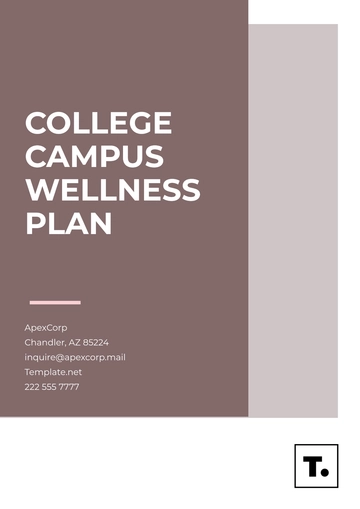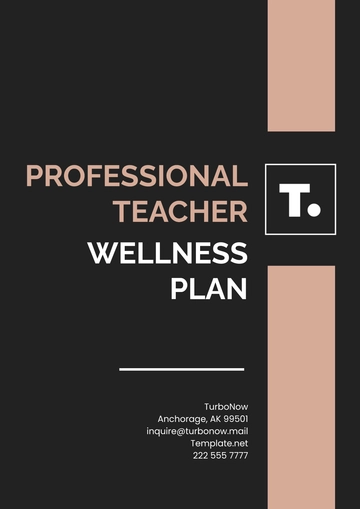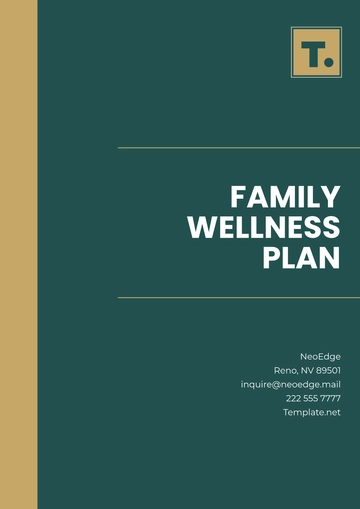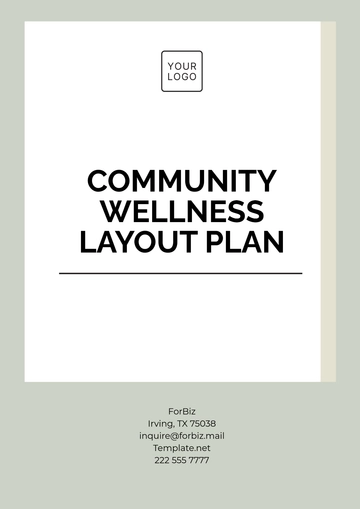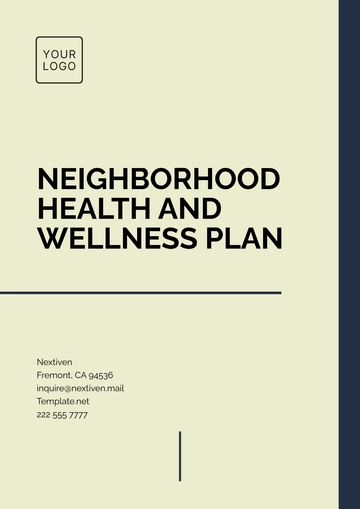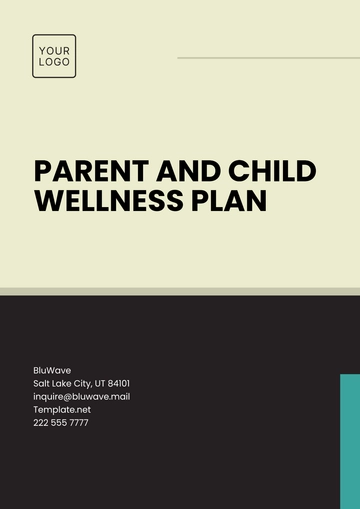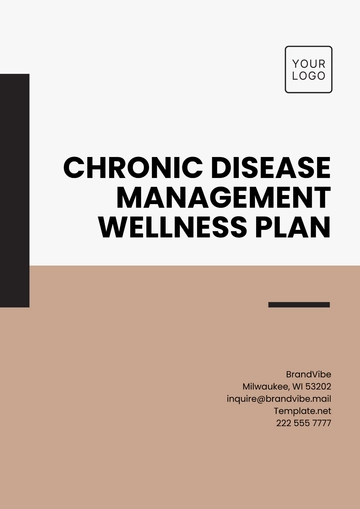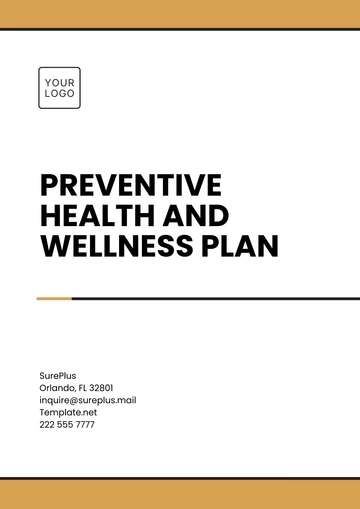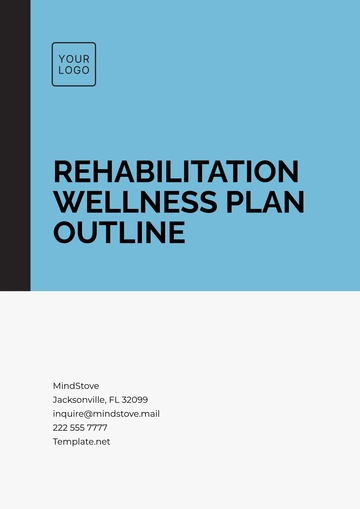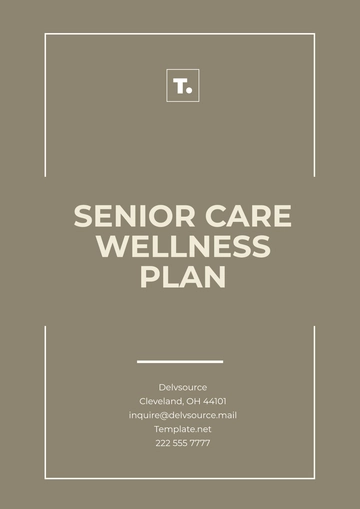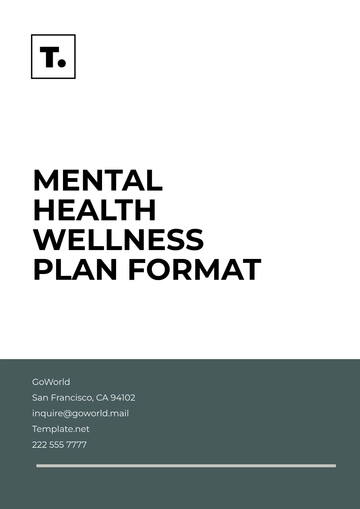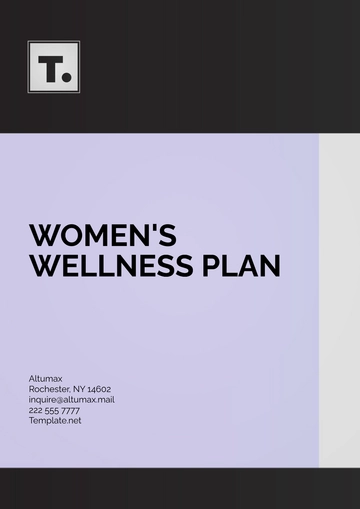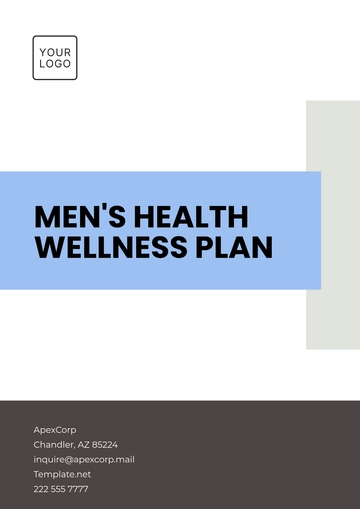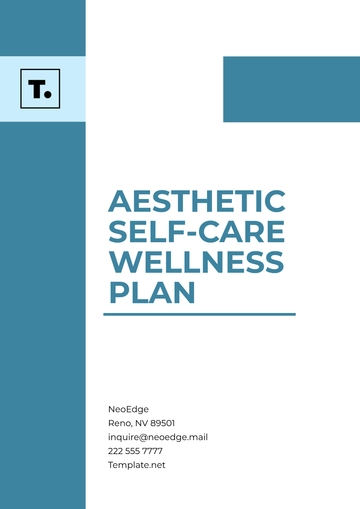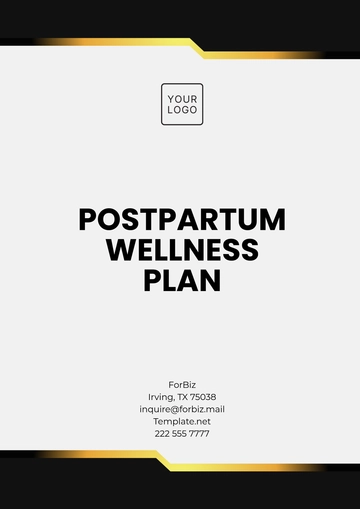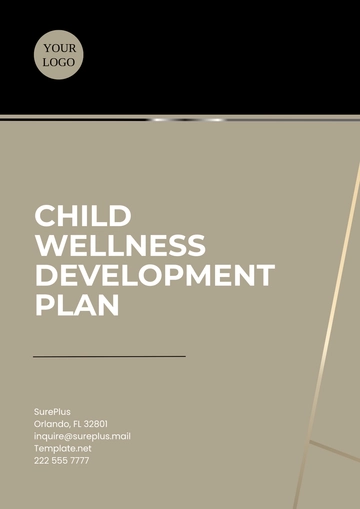Free Teen Wellness Plan
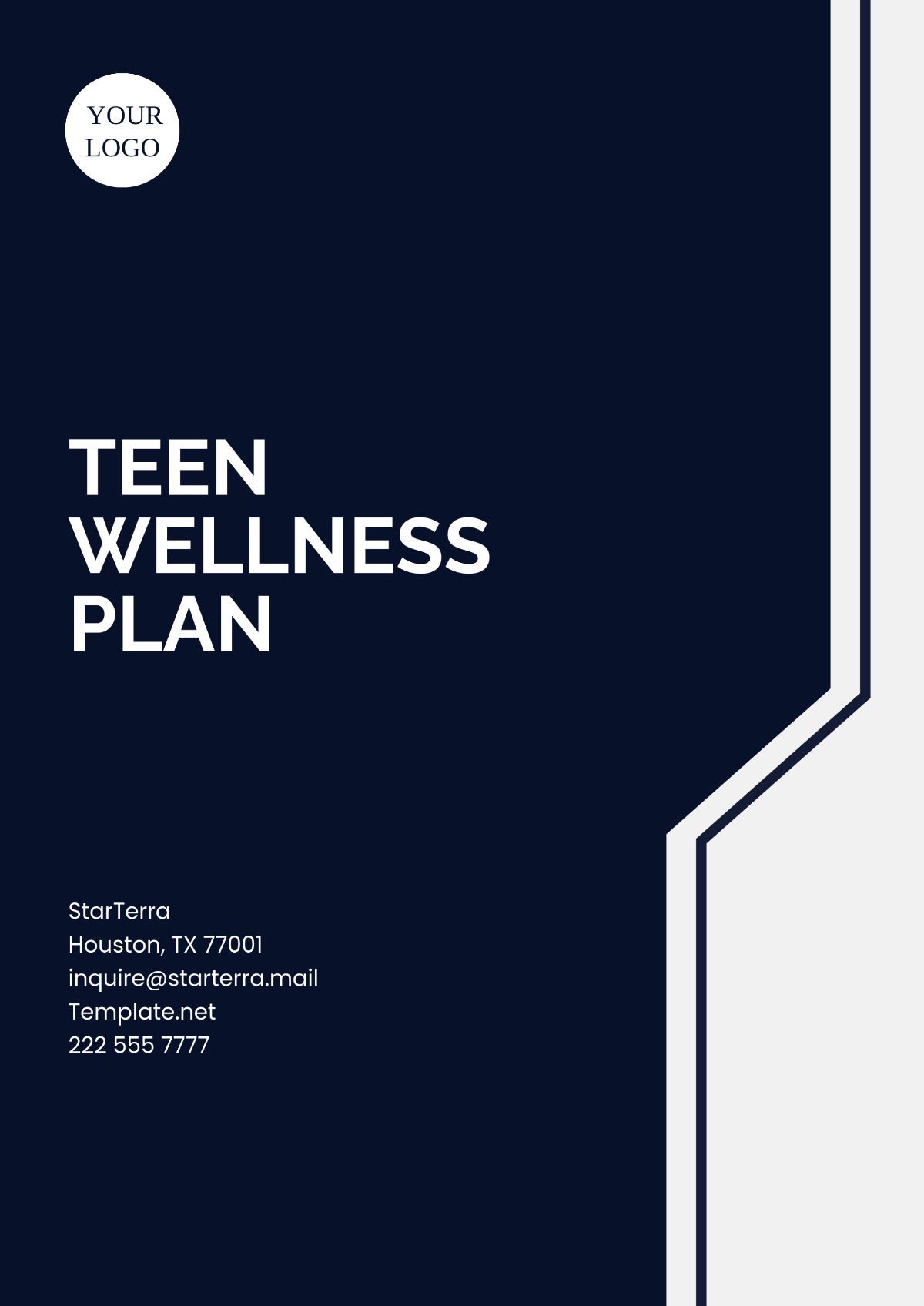
Prepared by: [Your Name]
Company: [Your Company Name]
Date: [Insert Date]
I. Introduction
Teenagers undergo significant physical, emotional, and mental changes as they navigate through adolescence. A comprehensive wellness plan for teens should address the key areas of physical health, mental well-being, nutrition, exercise, and social development. This plan is designed to help teenagers achieve a balanced and healthy lifestyle while dealing with the unique challenges they face during this stage of life.
II. Objectives
Physical Health:
Support physical growth and development through proper nutrition, exercise, and sleep.Mental Well-being:
Promote emotional health by managing stress, building resilience, and fostering positive self-esteem.Nutritional Balance:
Encourage healthy eating habits to support energy levels, growth, and development.Physical Activity:
Improve physical fitness and stamina through regular exercise and active hobbies.Social and Emotional Skills:
Strengthen communication skills, positive relationships, and coping mechanisms for stress.
III. Key Components of the Plan
A. Physical Health and Wellness
Strategies:
Nutrition and Hydration:
Ensure a balanced diet rich in fruits, vegetables, whole grains, lean proteins, and healthy fats. Encourage teens to drink at least 8 cups of water daily to stay hydrated.Sleep Hygiene:
Encourage teens to get 8-10 hours of sleep each night. Establish a regular sleep schedule, avoid screen time before bed, and create a relaxing bedtime routine.Preventive Healthcare:
Schedule regular check-ups with a healthcare provider for immunizations, health screenings, and early detection of any health concerns.Personal Hygiene:
Promote daily personal hygiene practices, including brushing teeth twice a day, showering regularly, and using deodorant.
B. Mental and Emotional Wellness
Strategies:
Stress Management:
Introduce mindfulness techniques, such as deep breathing exercises, meditation, and yoga, to reduce stress. Encourage time for relaxation and hobbies that promote mental calmness.Building Self-Esteem:
Help teens develop a positive self-image through self-affirmations, setting personal goals, and celebrating achievements, no matter how small.Social Support:
Encourage teens to build strong relationships with family, friends, and mentors. Make space for open conversations about feelings, challenges, and achievements.Mental Health Awareness:
Educate teens about the importance of mental health and encourage seeking professional help if experiencing anxiety, depression, or other mental health concerns. Provide access to counselors or therapists if needed.Journaling and Reflection:
Encourage journaling to help teens express their emotions, reflect on their day, and manage their thoughts.
C. Physical Activity and Fitness
Strategies:
Exercise Routine:
Encourage physical activity for at least 60 minutes a day, which can include activities such as walking, running, swimming, or cycling. Teens should also engage in muscle-strengthening activities 3 days a week.Sports and Hobbies:
Encourage participation in sports, dance, or other hobbies that promote physical fitness while being enjoyable. Joining a team or group activity can enhance social skills and teamwork.Stretching and Flexibility:
Incorporate stretching or yoga to improve flexibility and prevent injuries, especially after physical activity.Limit Screen Time:
Set limits on sedentary activities like video games or TV to encourage more movement and active play.
D. Nutrition and Eating Habits
Strategies:
Balanced Meals:
Encourage teens to eat a variety of healthy foods at each meal, focusing on whole foods like fruits, vegetables, lean proteins, and whole grains. Avoid excessive consumption of processed foods, sugary snacks, and beverages.Healthy Snacks:
Provide healthy snack options, such as nuts, yogurt, and fruit, to maintain energy levels throughout the day.Mindful Eating:
Teach teens to eat mindfully by focusing on their food, eating slowly, and recognizing hunger and fullness cues. Avoid distractions like TV or phones while eating.Reduce Sugar and Junk Food:
Encourage teens to limit sugary drinks, fast food, and processed snacks. Instead, opt for healthier alternatives like water, homemade smoothies, and baked snacks.
E. Social and Communication Skills
Strategies:
Effective Communication:
Teach teens to express their feelings and needs clearly and respectfully. Encourage active listening skills, empathy, and healthy conflict resolution.Building Positive Relationships:
Support teens in building positive, healthy relationships with peers, family, and teachers. Discuss the importance of respect, trust, and boundaries in relationships.Time Management and Organization:
Help teens develop time management skills, such as creating a schedule, setting priorities, and breaking tasks into manageable steps. This will help reduce stress and improve academic performance.Volunteerism and Social Contribution:
Encourage teens to engage in community service or volunteer work. This fosters empathy, social responsibility, and a sense of purpose.
IV. Monitoring and Evaluation
A. Key Performance Indicators (KPIs)
Physical Health:
Regular assessments of weight, height, and overall health at annual check-ups. Track improvements in energy levels, sleep quality, and hydration.Mental Health:
Self-assessment tools for emotional well-being, stress levels, and mental health. Encourage teens to reflect on their mood and coping mechanisms.Physical Activity:
Track the frequency and type of physical activity. Ensure that teens are participating in at least 60 minutes of activity most days of the week.Nutrition:
Review dietary habits by tracking meals and snacks. Monitor the inclusion of a variety of healthy food groups and the reduction of processed foods.Social and Emotional Development:
Regular check-ins to discuss social relationships, communication skills, and overall emotional health. Encourage open dialogue about challenges and successes.
B. Evaluation Methods
Regular Check-ins:
Have periodic conversations with teens to assess their progress, challenges, and satisfaction with the wellness plan.Family and Peer Feedback:
Gather feedback from family members, teachers, and friends regarding changes in behavior, mood, and overall wellness.Self-Reflection and Journaling:
Encourage teens to reflect on their experiences and make notes of improvements or areas that may require attention.
V. Conclusion
This Teen Wellness Plan provides a holistic approach to maintaining a healthy lifestyle by addressing physical, mental, emotional, and social well-being. By following this plan, teens can achieve a balanced and fulfilling life, with healthy habits that promote growth and resilience. It is essential to adjust and tailor this plan according to each teen’s individual needs and circumstances.
- 100% Customizable, free editor
- Access 1 Million+ Templates, photo’s & graphics
- Download or share as a template
- Click and replace photos, graphics, text, backgrounds
- Resize, crop, AI write & more
- Access advanced editor
You may also like
- Finance Plan
- Construction Plan
- Sales Plan
- Development Plan
- Career Plan
- Budget Plan
- HR Plan
- Education Plan
- Transition Plan
- Work Plan
- Training Plan
- Communication Plan
- Operation Plan
- Health And Safety Plan
- Strategy Plan
- Professional Development Plan
- Advertising Plan
- Risk Management Plan
- Restaurant Plan
- School Plan
- Nursing Home Patient Care Plan
- Nursing Care Plan
- Plan Event
- Startup Plan
- Social Media Plan
- Staffing Plan
- Annual Plan
- Content Plan
- Payment Plan
- Implementation Plan
- Hotel Plan
- Workout Plan
- Accounting Plan
- Campaign Plan
- Essay Plan
- 30 60 90 Day Plan
- Research Plan
- Recruitment Plan
- 90 Day Plan
- Quarterly Plan
- Emergency Plan
- 5 Year Plan
- Gym Plan
- Personal Plan
- IT and Software Plan
- Treatment Plan
- Real Estate Plan
- Law Firm Plan
- Healthcare Plan
- Improvement Plan
- Media Plan
- 5 Year Business Plan
- Learning Plan
- Marketing Campaign Plan
- Travel Agency Plan
- Cleaning Services Plan
- Interior Design Plan
- Performance Plan
- PR Plan
- Birth Plan
- Life Plan
- SEO Plan
- Disaster Recovery Plan
- Continuity Plan
- Launch Plan
- Legal Plan
- Behavior Plan
- Performance Improvement Plan
- Salon Plan
- Security Plan
- Security Management Plan
- Employee Development Plan
- Quality Plan
- Service Improvement Plan
- Growth Plan
- Incident Response Plan
- Basketball Plan
- Emergency Action Plan
- Product Launch Plan
- Spa Plan
- Employee Training Plan
- Data Analysis Plan
- Employee Action Plan
- Territory Plan
- Audit Plan
- Classroom Plan
- Activity Plan
- Parenting Plan
- Care Plan
- Project Execution Plan
- Exercise Plan
- Internship Plan
- Software Development Plan
- Continuous Improvement Plan
- Leave Plan
- 90 Day Sales Plan
- Advertising Agency Plan
- Employee Transition Plan
- Smart Action Plan
- Workplace Safety Plan
- Behavior Change Plan
- Contingency Plan
- Continuity of Operations Plan
- Health Plan
- Quality Control Plan
- Self Plan
- Sports Development Plan
- Change Management Plan
- Ecommerce Plan
- Personal Financial Plan
- Process Improvement Plan
- 30-60-90 Day Sales Plan
- Crisis Management Plan
- Engagement Plan
- Execution Plan
- Pandemic Plan
- Quality Assurance Plan
- Service Continuity Plan
- Agile Project Plan
- Fundraising Plan
- Job Transition Plan
- Asset Maintenance Plan
- Maintenance Plan
- Software Test Plan
- Staff Training and Development Plan
- 3 Year Plan
- Brand Activation Plan
- Release Plan
- Resource Plan
- Risk Mitigation Plan
- Teacher Plan
- 30 60 90 Day Plan for New Manager
- Food Safety Plan
- Food Truck Plan
- Hiring Plan
- Quality Management Plan
- Wellness Plan
- Behavior Intervention Plan
- Bonus Plan
- Investment Plan
- Maternity Leave Plan
- Pandemic Response Plan
- Succession Planning
- Coaching Plan
- Configuration Management Plan
- Remote Work Plan
- Self Care Plan
- Teaching Plan
- 100-Day Plan
- HACCP Plan
- Student Plan
- Sustainability Plan
- 30 60 90 Day Plan for Interview
- Access Plan
- Site Specific Safety Plan
